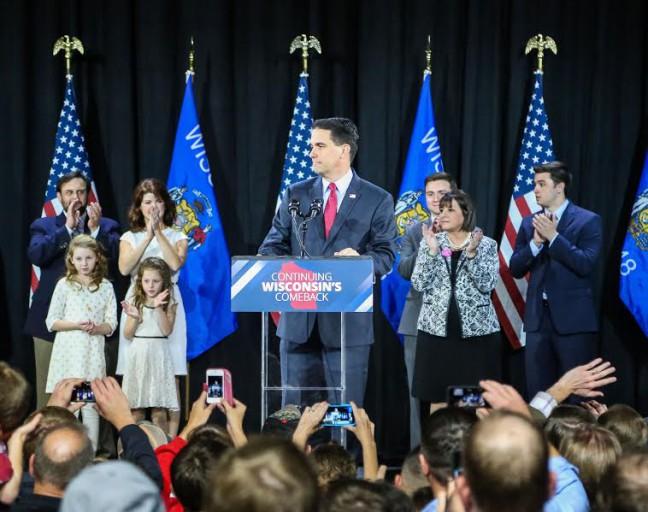The University of Wisconsin is at the receiving end of a bait-and-switch at the hands of Wisconsin Republicans.
When the news broke Walker was proposing a $300 million budget cut to the UW System, the blow was softened by the possibility of UW getting more autonomy from the state. This autonomy is something the system has wanted for years. In addition to allowing UW schools more power to set tuition, it would also give them more freedom in a variety of logistical matters. While there were protests against the proposed cuts, they were significantly muted with the possibility of UW becoming a public authority.
This was partly due to the nature of the news cycle — when two big news stories break simultaneously, they each get less coverage than if they had happened separately. Essentially, the possibility of increased autonomy served as a distraction. While UW stakeholders were busy debating the merits of and planning for increased autonomy, their focus was not solely lobbying against the cuts.
Further, there is without doubt truth to Walker’s claims that the public authority model would likely offset the effects of the cuts, at least to some degree. Although UW schools would still have difficulty dealing with the cuts, they would at least be able to save money (or increase tuition) using their newfound autonomy. This helped the cuts make more palatable — the system wasn’t crazy about the cuts, but at least they were getting something they wanted in return.
For a cynic, then, it’s not overly surprising that the public authority model could be, according to Rep. John Nygren, R-Marinette, on “life support.”
Top Republican says public authority plan ‘might be on life-support’
Part of the reason some Assembly Republicans oppose giving the UW System more autonomy is that the Board of Regents is planning to maintain things like shared governance and tenure. The system’s commitment to such policies apparently shows they are not going to “revolutionize the system” and how it works. Nygren said, for example, that “if they’re not going to be serious about doing it, I don’t think we should give them that authority.”
Board of Regents tackles public authority, looks to protect shared governance, tenure
This would be hilarious if it weren’t so sad. Nygren is saying Assembly Republicans were fine with giving the UW System more “autonomy,” so long as the system would do exactly what Republicans want them to do. The problem is that’s not autonomy. It is the opposite of autonomy.
Walker is, if anything, a savvy politician. As such, there is no way Walker didn’t consult with Republicans in the Legislature before making the proposal. He must have known it was likely that the public authority proposal would never even get to his desk.
GOP lawmakers’ new budget plan for UW System would scrap public authority proposal
This raises the question, then, of why he would make the proposal in the first place. The answer seems simple: everything written above. It served to mute criticism of the budget cuts, and it kept students, faculty and administrators distracted.
There is another angle, however: Proposing something he can sell as bipartisan gives him a way to respond to criticism of these cuts during his presidential campaign. Despite the current state of politics in Wisconsin, massive cuts to public education are not terribly popular among moderates throughout the country, so Walker needs a way to defend his repeated gutting of public education during his time as governor.
Walker’s actions are deplorable. In stringing along UW System officials, he has wasted everyone’s time. If the cuts are going to happen either way, it would have been far more helpful for Walker to be honest and allow the system to plan for those cuts rather than spending time planning for a public authority model that was never going to happen anyway.
UW has done a lot to mend their relationship with the state government. UW Chancellor Rebecca Blank’s experience in dealing with politics was likely a major reason she was hired in the first place. However, in order for the UW System and the state to work together more effectively, the state must negotiate in good faith. If the last few months are any indication, this will not be the case.
Joe Timmerman ([email protected]) is a senior majoring in math and economics.








